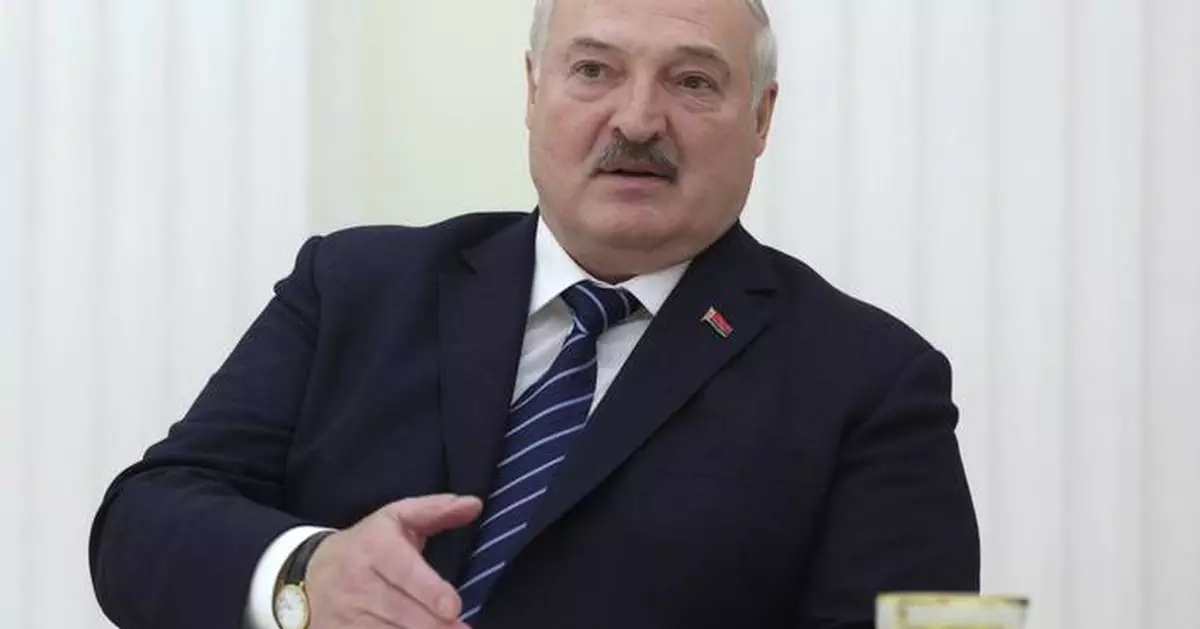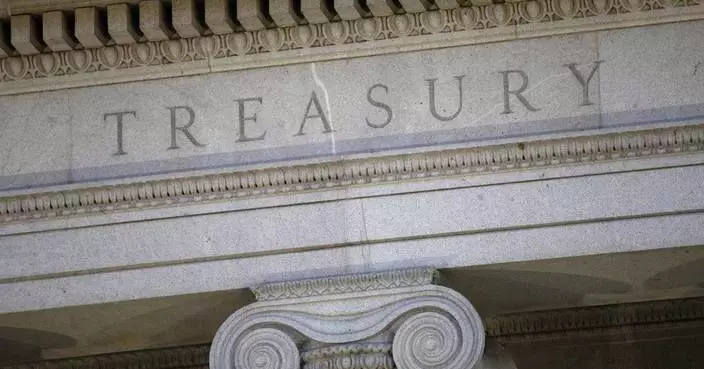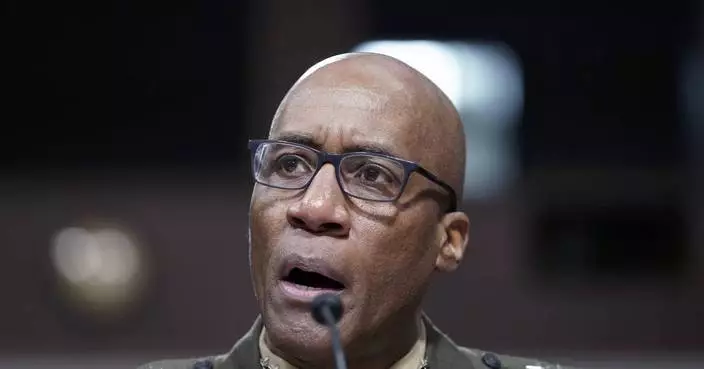TALLINN, Estonia (AP) — Belarusian authorities on Friday convicted a famous dissident rock band, designating the band and its three members as extremist and sentencing them to two years of correctional labor. It was the latest in a yearslong crackdown on dissent that has engulfed this country of 9.5 million people.
Nizkiz band members — Alyaksandr Ilyin, Siarhei Kulsha and Dzmitry Khalyaukin — were charged with “organizing and plotting actions grossly violating public order.”
In 2020, when Belarus was rocked by mass protests that erupted after President Alexander Lukashenko won a sixth term in office in a disputed election, the band released “Rules,” a song that became the protests' anthem. A music video for the song was filmed at one of the demonstrations against the country's authoritarian leader.
Lukashenko's government unleashed a brutal crackdown in response to the protests, arresting more than 35,000 people and violently beating thousands. Many have been labeled as “extremists," a designation frequently used against critics. The repressions have continued to this day.
In addition to the sentencing, the band and the musicians were also added to the state registry of extremists, which effectively means a ban on its songs and exposes Nizkiz's fans to prosecution.
The band was founded in 2008 in the city of Mogilev in the east of the country. In January 2024, Ilyin, Kulsha and Khalyaukin were arrested and initially faced petty charges, but then authorities opened a criminal case against them. They have been behind bars since then.
In February, the Viasna human rights center declared them political prisoners. According to the group, which is the oldest and the most prominent in the country, there are currently 1,387 political prisoners in Belarus, including Viasna's founder Ales Bialiatsky, who won the Nobel Peace Prize in 2022.
Belarus' opposition leader Sviatlana Tsikhanouskaya on Friday urged musicians around the world “to express solidarity with their Belarusian colleagues, who were convicted over the songs of freedom.”
“The Belarusian regime continues a ruthless attack on our culture,” Tsikhanouskaya said in written comments sent to The Associated Press.
“Nizkiz's songs sounded during the 2020 protests," she said. "That's why the members of this popular band were brutally detained in their apartments and then convicted. It is yet another shameful act of the regime's revenge.”

Belarusian President Alexander Lukashenko speaks to the Space crew members of the 21st visiting expedition to the International Space Station (ISS) Roscosmos cosmonaut Oleg Novitsky, left, and the first Belarusian cosmonaut Marina Vasilevskaya during their meeting with Russian President Vladimir Putin, at the Kremlin in Moscow, Russia, Friday, April 12, 2024. (Gavriil Grigorov, Sputnik, Kremlin Pool Photo via AP)
TBILISI, Georgia (AP) — Georgia's parliament on Wednesday moved a step closer to passing a law that critics fear will stifle media freedom and endanger the country's European Union membership bid, as tens of thousands of protesters thronged surrounding streets.
The vote occurred hours after dozens of people were arrested as police overnight used tear gas and water cannons to disperse the latest protest. Protesters denounce the bill as “the Russian law” because neighboring Russia uses similar legislation to stigmatize independent news media and organizations critical of the Kremlin.
The law would require media and non-commercial organizations to register as “pursuing the interests of a foreign power” if they receive more than 20% of funding from abroad. The ruling Georgian Dream party withdrew a similar proposal last year after large crowds protested.
Eighty-three of Georgia’s 150 lawmakers approved the bill in its second reading. A third and final vote in Parliament is needed before it can be signed into law. That's expected in the coming days.
Russia-Georgia relations have been complicated and turbulent since the Soviet Union’s collapse in the early 1990s. Georgia joined international resolutions condemning Russia's invasion of Ukraine, but it also became a main destination for Russians fleeing military mobilization and political crackdowns. Even Georgia's ruling party has seen internal tensions over its neighbor.
The Interior Ministry said 63 people were detained in the latest protest.
On Wednesday, Georgian TV showed Levan Khabeishvili, chairman of the pro-West United National Movement party, arriving in Parliament with bandages on his nose and forehead. Members of Khabeishvili's party said he had been assaulted by police during the protests.
Purple bruising and cuts were visible around Khabeishvili's left eye as he urged fellow lawmakers to scrap the bill.
“If you are not interested in how the leader of the main opposition party has been beaten up, then — for the sake of those young people who were injured, who were hit on the heads and bruised — I want to ask you once more, even though I do not have any hope, withdraw this law,” he said.
Deputy Interior Minister Aleksandre Darakhvelidze alleged at a briefing that Khabeishvili broke through a police cordon the night before and was injured while he “resisted.” Darakhvelidze alleged that protesters and opposition leaders were “constantly committing violence.” Police broke up the protest after demonstrators tried to block entrances to Parliament.
As protesters gathered once more Wednesday, opposition lawmaker Beqa Liluashvili published a live video from the Parliament chamber showing lawmakers shouting and physically confronting each other. One threw a stack of papers at opponents. Others restrained colleagues.
Opposition lawmaker Helene Khoshtaria accused the ruling party of trying to “drag Georgia into Russian influence” and “close off its European future.”
Speaking to The Associated Press outside Parliament, she described authorities’ response to the rallies as “extremely authoritarian" but said it would not dissuade the protesters.
“We do not want the Soviet regime that our parents have experienced," one protester, Kato Salukvadze, told the AP late Tuesday. “I think that everyone should be in the streets and say no to the Russian law and yes to Europe."
Georgia’s President Salome Zourabichvili, increasingly at odds with the governing party, has criticized the bill and vowed to veto it if it is passed by parliament. But the governing party can overrule the veto and ask the parliament speaker to sign the bill into law.
The Georgian presidency, which has notably limited powers, will switch this year from a directly elected position to one chosen by a college of electors that includes members of parliament.

Demonstrators argue with police that blocked them during an opposition protest against "the Russian law" near the Parliament building in Tbilisi, Georgia, on Wednesday, May 1, 2024. Protesters denounce the bill as "the Russian law" because Moscow uses similar legislation to stigmatize independent news media and organizations critical of the Kremlin. (AP Photo/Zurab Tsertsvadze)

Demonstrators blocked by the police wave a EU flag during an opposition protest against "the Russian law" near the Parliament building in Tbilisi, Georgia, on Wednesday, May 1, 2024. Protesters denounce the bill as "the Russian law" because Moscow uses similar legislation to stigmatize independent news media and organizations critical of the Kremlin. (AP Photo/Zurab Tsertsvadze)

Police face demonstrators during an opposition protest against "the Russian law" near the Parliament building in Tbilisi, Georgia, on Wednesday, May 1, 2024. Protesters denounce the bill as "the Russian law" because Moscow uses similar legislation to stigmatize independent news media and organizations critical of the Kremlin. (AP Photo/Zurab Tsertsvadze)

A woman shows a heart standing in front of riot police during an opposition protest against "the Russian law" near the Parliament building in Tbilisi, Georgia, on Wednesday, May 1, 2024. Clashes erupted between police and opposition demonstrators protesting a new bill intended to track foreign influence that the opposition denounced as Russia-inspired. (AP Photo/Zurab Tsertsvadze)
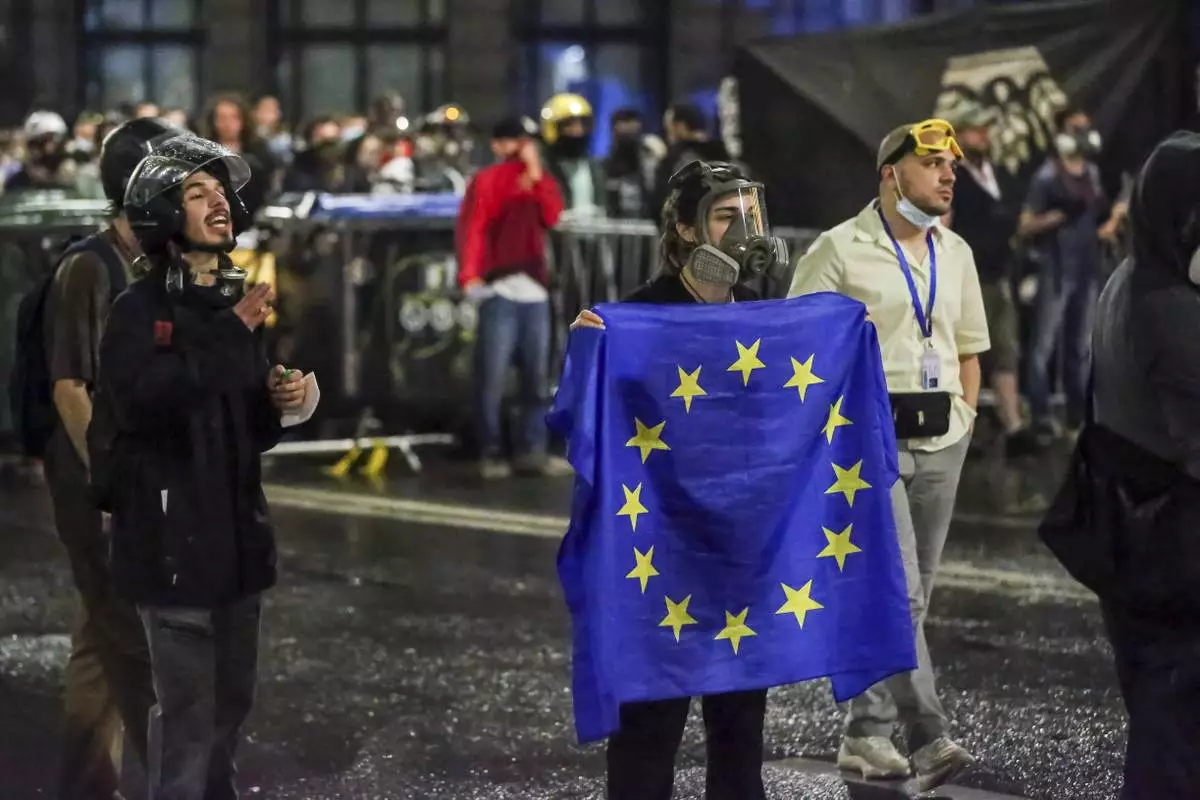
A demonstrator stands with a EU flag in front of police block during an opposition protest against "the Russian law" near the Parliament building in Tbilisi, Georgia, on Wednesday, May 1, 2024. Clashes erupted between police and opposition demonstrators protesting a new bill intended to track foreign influence that the opposition denounced as Russia-inspired. (AP Photo/Zurab Tsertsvadze)
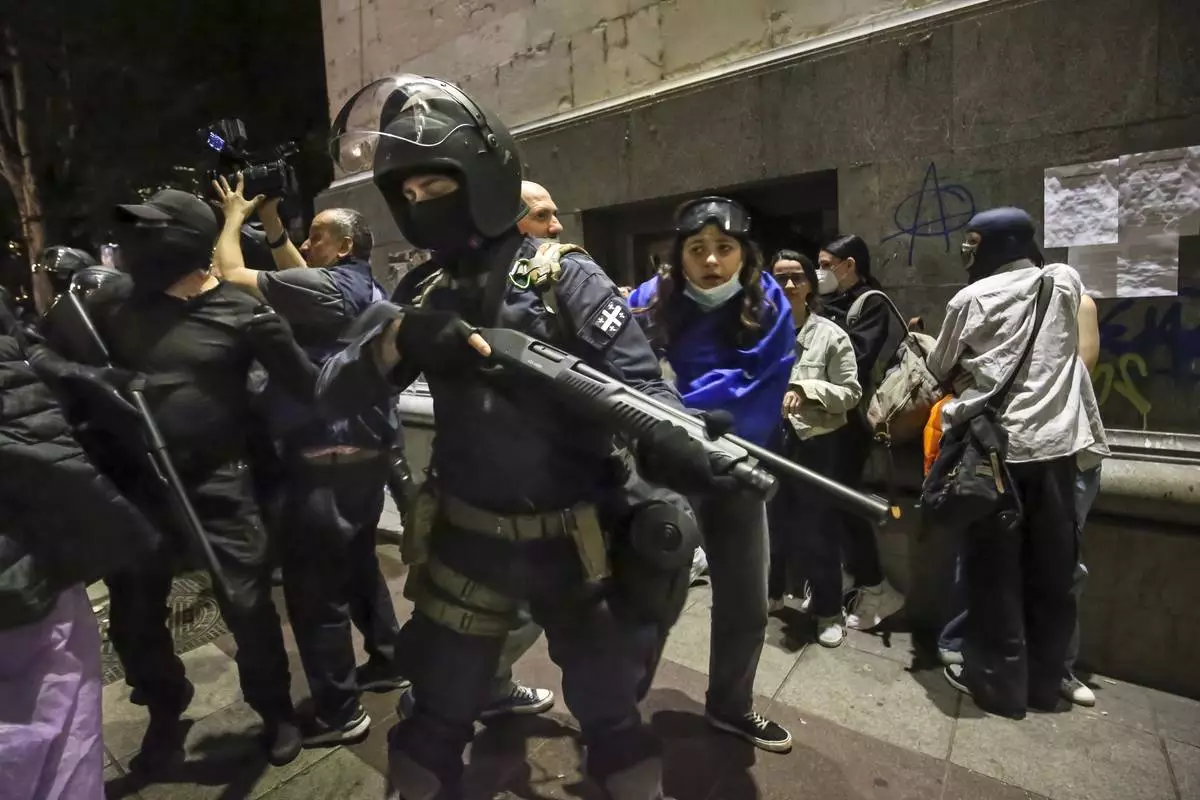
Riot policemen stand ready to fire gas grenade during an opposition protest against "the Russian law" near the Parliament building in Tbilisi, Georgia, on Wednesday, May 1, 2024. Clashes erupted between police and opposition demonstrators protesting a new bill intended to track foreign influence that the opposition denounced as Russia-inspired. (AP Photo/Zurab Tsertsvadze)
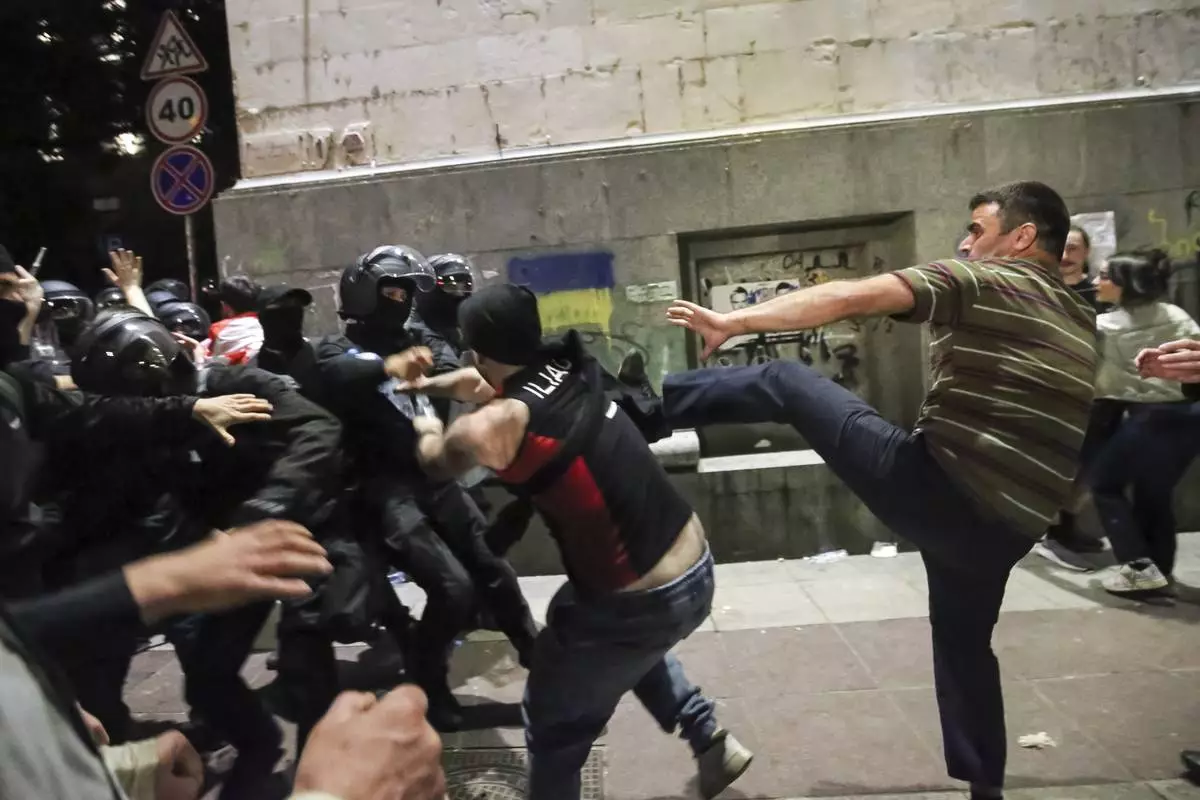
Demonstrators scuffle with riot police during an opposition protest against "the Russian law" near the Parliament building in Tbilisi, Georgia, on Wednesday, May 1, 2024. Clashes erupted between police and opposition demonstrators protesting a new bill intended to track foreign influence that the opposition denounced as Russia-inspired. (AP Photo/Zurab Tsertsvadze)
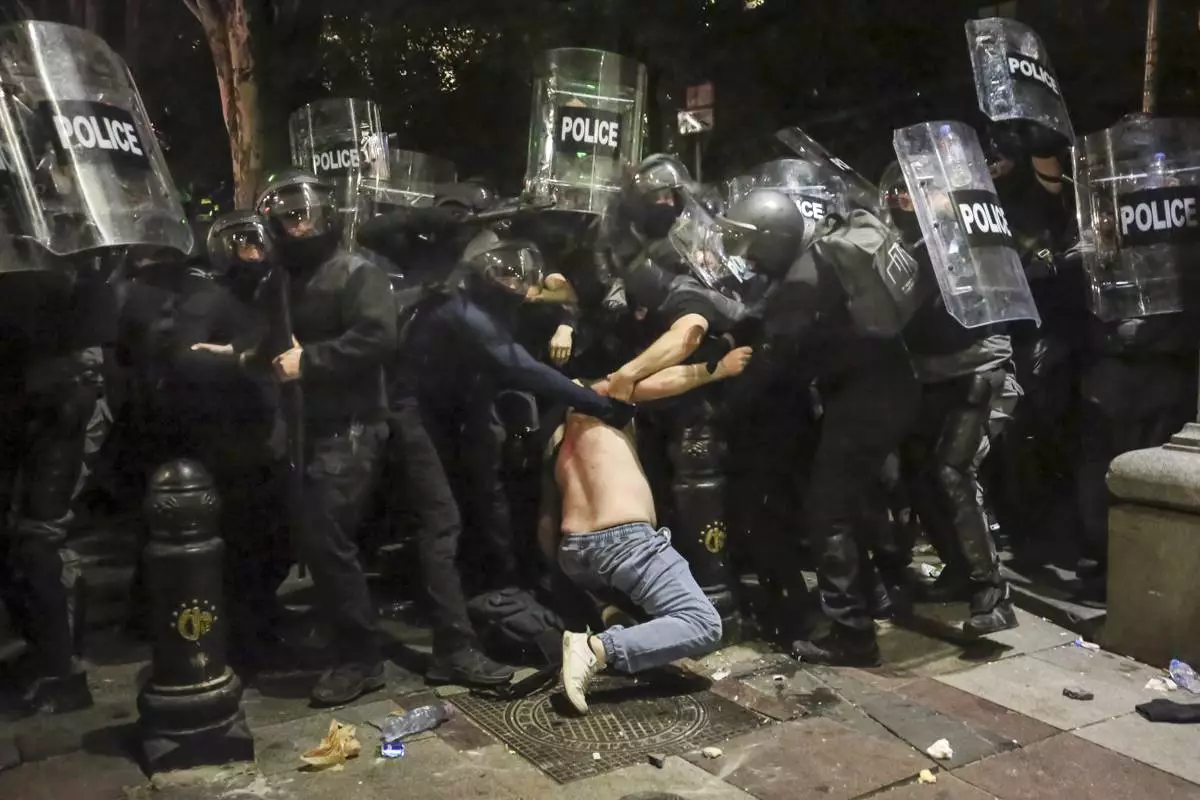
Riot police detain a demonstrator during an opposition protest against "the Russian law" near the Parliament building in Tbilisi, Georgia, on Wednesday, May 1, 2024. Clashes erupted between police and opposition demonstrators protesting a new bill intended to track foreign influence that the opposition denounced as Russia-inspired. (AP Photo/Zurab Tsertsvadze)
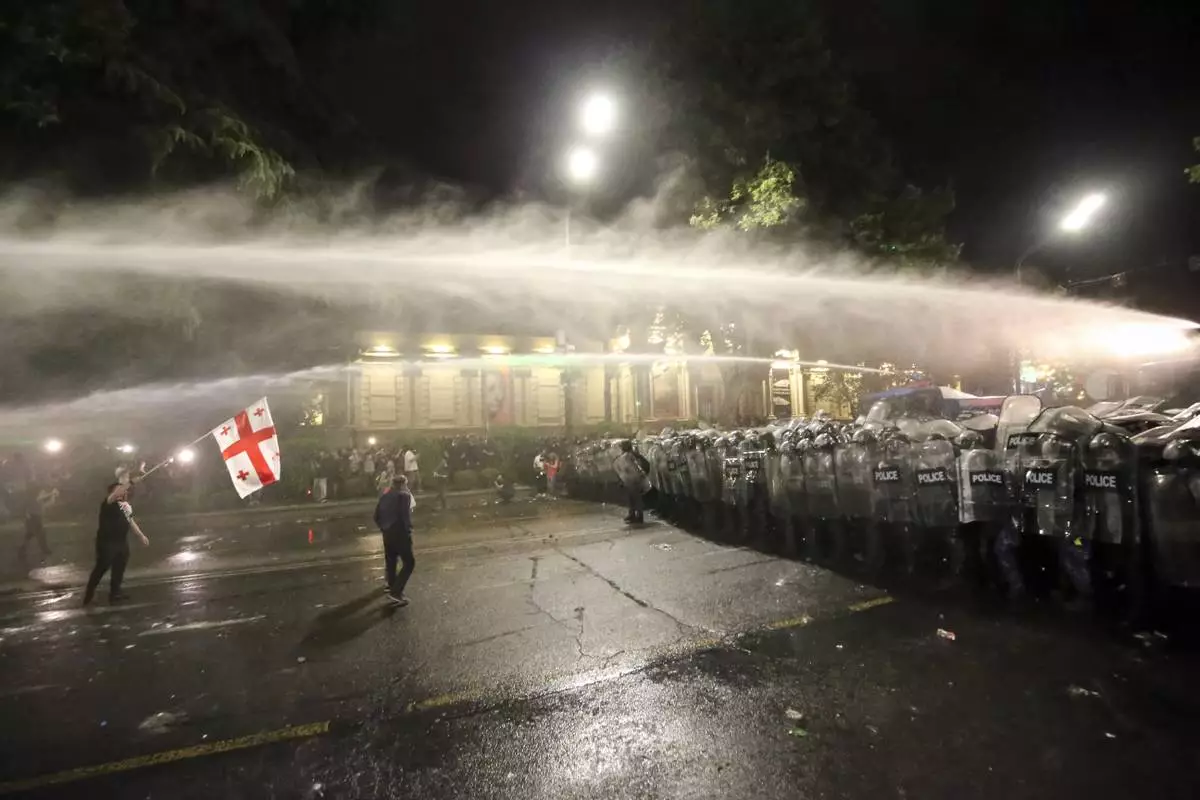
Riot police use a water cannon during an opposition protest against "the Russian law" near the Parliament building in Tbilisi, Georgia, on Wednesday, May 1, 2024. Clashes erupted between police and opposition demonstrators protesting a new bill intended to track foreign influence that the opposition denounced as Russia-inspired. (AP Photo/Zurab Tsertsvadze)
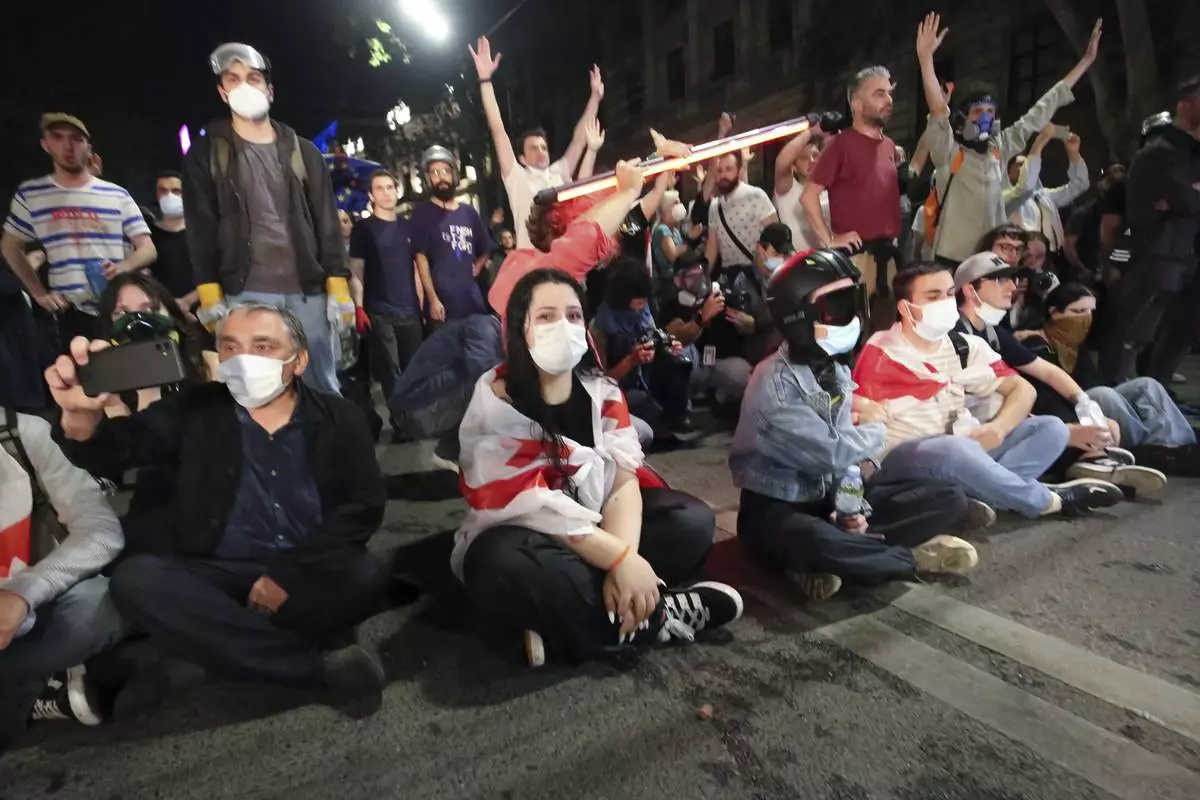
Demonstrators sit in front of police line during an opposition protest against "the Russian law" near the Parliament building in Tbilisi, Georgia, on Tuesday, April 30, 2024. Clashes erupted between police and opposition demonstrators protesting a new bill intended to track foreign influence that the opposition denounced as Russia-inspired. (AP Photo/Zurab Tsertsvadze)



